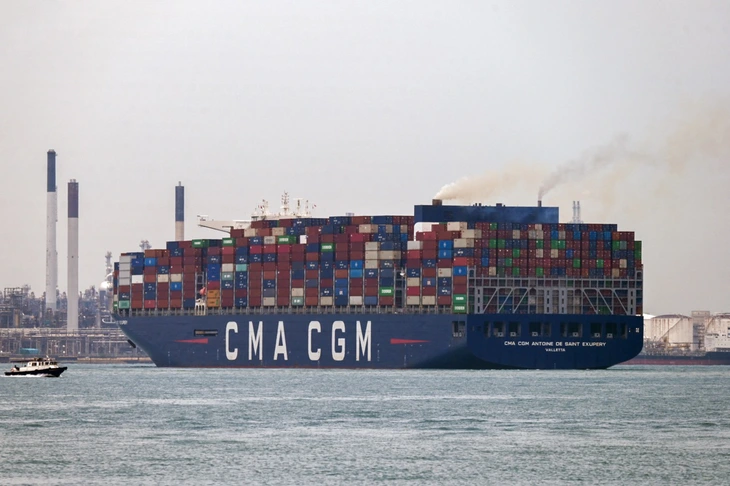
A container ship leaves Pasir Panjang port in Singapore on April 4, 2025 - Photo: AFP
A bulletin from the US Customs and Border Protection noted that goods en route to the US before 12:01 a.m. on April 5 will avoid the 10% tax if they arrive before May 27.
US starts collecting taxes, is there a grace period?
According to Reuters, the basic tax rate of 10% has been effective at US seaports, airports and customs warehouses since 0:01 on April 5, Eastern time (ie 11:01 the same day in Vietnam).
The first countries to be taxed at 10% include Australia, the UK, Colombia, Argentina, Egypt and Saudi Arabia.
A bulletin from U.S. Customs and Border Protection sent to shipping companies said there will be no grace period for goods en route to the United States as of the night of April 5.
However, a separate bulletin from the bureau also announced that there will be a 51-day grace period for goods that were loaded on ships or planes and were en route to the US before 12:01 a.m. Saturday. These shipments must arrive by 12:01 a.m. on May 27 (Eastern US time) to avoid being hit with the 10% tariff.
Next, at 0:01 on April 9, a higher “reciprocal” tax rate of 11-50% will come into effect. Imports from the European Union will be taxed at 20%, while Chinese goods will be taxed at an additional 34%, bringing the total tax rate on Chinese goods to 54%.
Canada and Mexico are exempt from Mr. Trump’s new tariffs, as they are already subject to a 25 percent fentanyl-related tariff on goods that do not comply with the rules of origin of the U.S.-Mexico-Canada Free Trade Agreement.
This reciprocal tariff also does not affect steel, aluminum, automobile and auto parts products, as these items are already subject to a 25% tax for national security reasons.
The Trump administration also announced a list of more than 1,000 tax-exempt product categories, with a total value of 645 billion USD in import turnover in 2024.
These items include crude oil, petroleum products and other energy commodities, pharmaceuticals, uranium, titanium, timber, semiconductors, copper. In addition to energy, the US government is investigating the possibility of imposing additional national security tariffs on many of these sectors.
Volatile market
Mr. Trump's tariff announcement on April 2 shook the global stock market, causing $5,000 billion in market capitalization of companies in the S&P 500 index to "evaporate" by the end of the trading session on April 4.
“This is the biggest trade action of our time,” said Kelly Ann Shaw, a trade lawyer at Hogan Lovells and former White House trade adviser during Donald Trump’s first term as president.
At an event on April 3, Ms. Shaw expressed the expectation that tariffs would change over time as countries seek to negotiate lower tariffs. “But this is an incredibly large and significant change in the way we trade with every country in the world ,” she emphasized.
While Mr Trump’s phased tariff deadlines provide room for countries to negotiate, “if they are not granted exemptions, they are likely to retaliate, as China has done,” Oxford Economics warned this week.
Beijing has announced that it will retaliate by imposing a 34% tax on US goods from April 10, and will sue the US at the World Trade Organization (WTO).
According to AFP, European Union Trade Commissioner Maros Sefcovic said the bloc would act "calmly, cautiously and unitedly," and would give time for negotiations. However, he added that the EU "will not stand idly by." Meanwhile, France and Germany said the EU could respond by imposing taxes on US technology companies.
Source: https://tuoitre.vn/hang-hoa-den-my-bat-dau-bi-danh-thue-10-20250405142811917.htm




![[Photo] Prime Minister Pham Minh Chinh receives the delegation of the Semiconductor Manufacturing International (SEMI)](https://vphoto.vietnam.vn/thumb/1200x675/vietnam/resource/IMAGE/2025/11/06/1762434628831_dsc-0219-jpg.webp)
![[Photo] Closing of the 14th Conference of the 13th Party Central Committee](https://vphoto.vietnam.vn/thumb/1200x675/vietnam/resource/IMAGE/2025/11/06/1762404919012_a1-bnd-5975-5183-jpg.webp)

































































































Comment (0)